- Home
- J. M. Hayes
Plains Crazy Page 3
Plains Crazy Read online
Page 3
It was an unremarkable eight-and-one-half-by-eleven sheet of paper, suitable for typing, copying, or computer printout. She couldn’t see any watermarks, just the text that covered the top third of the page.
government buildings are legitimate targets in a war. our device was timed to minimize collateral damage, but, should deaths occur, we are prepared to accept them, as has your nation. while the united states occupies the sovereign territory of iraq—in the name of democracy but for purposes of imperialism and to possess oil resources—we shall counterstrike at the heartland of our enemy. this is the first. those to follow shall escalate.
prepare to experience your own shock and awe. fear us. we are the holy Judgment against Infidels, Heresy And global Domination.
Even Mrs. Kraus was quick to note that the only capitalized letters contained in the message spelled JIHAD.
***
“He’s over here,” Doc said, waving toward a path above the creek.
Doctor Jones was Benteen County Coroner. He was nearing retirement age, though few would guess it. Most days. More and more, however, the sheriff had observed that the years weighed on Doc when he had to preside over rites of passage involving violent deaths of the young. Not that Benteen County had many of those, and virtually none of a criminal nature. But it had accidents—too much booze and too many horsepower, too little attention paid to sharp and powerful farm machinery, too much certainty that the gun wasn’t loaded. Occasionally, too much despair.
“You okay, Englishman?” Doc asked, indicating Doc wasn’t the only one the worse for wear this morning. “Things all right at home?” The sheriff was glad his dark complexion disguised the flush he felt wash across his face.
“Just the usual,” he grossly exaggerated.
Doc didn’t press it. “Your crime scene’s been stomped all to hell and gone, but when I heard you were on the way I decided I’d leave him where he died until you got a look.”
The sheriff nodded. He and Deputy Parker followed as Doc led the way up from the creek and into the trees and foliage that hugged its banks. The body lay in a muddy clearing beneath a thick cottonwood. It was under a plastic sheet that Doc bent and pulled aside. The soil was rust-colored, softened and tinted by a considerable quantity of blood. The boy was pale from the loss.
This clearing was more apparent than real. A trail of sorts passed through here, but had been widened by the frenzied footprints of those who crowded around and tried to save this boy.
The corpse lay on its back, naked. In death, it seemed too young and innocent to have been enjoying vigorous sex when it died.
“What can you tell me, Doc?”
Doc sighed and tugged on one of his big, protruding ears for a moment. He pulled a notebook out of his pocket, but he didn’t bother to refer to it.
“Boy’s sixteen, a perfectly normal adolescent male. Evidence of recent sexual activity. Got a wound in his back just below his left shoulder blade. An arrow, I’m told. I’ll know more when I get him back to Klausen’s Funeral Parlor for an autopsy, but I don’t think we’re gonna find any surprises. From what they tell me, they pulled the arrow out and didn’t get the tip. I expect it’s still in there, and it perforated the heart or one of the main arteries. Kid probably died in seconds. If not, they sure worked that point around in him while they were doing CPR. I may have a hell of a time figuring out what got damaged first. Fellow who did the CPR, he’s a trained med-tech for the PBS people. Says he couldn’t find a pulse when he got here. Still, didn’t think he had any choice but to try. Looks to me like all he managed was to pump a lot of blood out of the wound and into the ground.”
The sheriff grunted in agreement.
“When you’re through, you and Parker can help me load him in a body bag and tote him to my Buick.”
“I can’t think of anything he can tell me,” the sheriff said. “Let’s get him ready to go.” He turned to Deputy Parker. “Where’s the arrow?”
It was in a plastic bag at the base of the cottonwood. It didn’t look at all like what the sheriff had expected. “This come from a museum?” he frowned. “Shit! Don’t tell me. It’s Cheyenne, right?”
Parker nodded. “That’s what the one legitimate Cheyenne who’s here says. The man took one look and pointed at those four grooves that circle the shaft and the turkey feathers it’s fletched with and said it was the kind his tribe used to make.”
“One more reason to talk to my brother,” the sheriff observed.
“Maybe,” Parker said, “but don’t forget, this PBS thing is supposed to recreate an 1860s Cheyenne village. All the participants have been issued bows and quivers.”
“Like this one?” The sheriff’s cell phone went off and he answered and almost missed her response beneath the frantic voice of Mrs. Kraus.
“No,” Parker said. “That old man—the real Cheyenne—he told us none of the others are authentic.”
***
Deputy Wynn was questioning suspects. It wasn’t going quite the way he’d pictured it. Part of the problem was that everybody was a suspect, and thus, not to be let out of his sight. And part of it was that questioning required a level of individual privacy you couldn’t achieve while guarding the whole bunch.
It didn’t help that he wasn’t sure where some of them had gone. He hadn’t even been able to get an accurate count, but he was sure there’d been more witnesses as he herded them back from the crime site at Deputy Parker’s suggestion.
He hadn’t been enthusiastic about that at first. Then she’d offered to begin the investigation while he stayed behind and kept anyone else from disturbing evidence until Doc Jones and Englishman got there. Wynn had been quick to see which was the interesting job and jump on it.
Wynn decided right off not to take them back to the fake Indian encampment. Tents didn’t appeal to him. They brought back unpleasant memories of his Boy Scout days—frogs and insects in his sleeping bag and, once, most of a can of pressurized whipped cream.
What did he have? Maybe twenty, maybe more. Four families of “Indians,” the people attempting to recreate the lifestyle of the Cheyenne, numbered more than a dozen all by themselves. Being around the “Indians” made him feel awkward. First, they were all clothed in funny robes and dresses. Most of the men wore embarrassing breechcloths and leggings and not much else. And the Ramseys, the parents of the naked kid lying in the mud down by the creek, were demanding to know what happened and what was going to be done about it. Craving reassurance that everything would be all right, including the hideous truth. Hell, their kid was dead. Things were definitely not going to be all right. Wynn was relieved when some of the film crew and a couple of women from the other families led them away to console them elsewhere. Well, he would get around to suspecting the immediate family later, when they weren’t so obviously upset.
Part of the film crew wasn’t at the site. He’d gotten that from the producer, a big man with prematurely graying hair who seemed more concerned about what the death was going to do to his schedule than the grief visited upon the Ramseys. The rest, another dozen or so, went about putting together coffee and food for everyone. They had the disturbing habit of disappearing into the cluster of big recreational vehicles that made up their offices and living quarters. He couldn’t keep track of them, but, by setting up his investigation under an awning attached to one of those vehicles, he kept a clear view of the road into the pasture. He contented himself with being sure no one was making a break for it in the variety of cars and trucks associated with the project.
Wynn was pretty confident that Daphne Alights on the Cloud wasn’t the killer. Maybe she’d been at the scene, but she was obviously an innocent bystander. Wynn let his glance travel over the remarkable curves hardly disguised by the shorts and halter she’d put on after reporting the death. He was not the sort who would normally try to picture what things looked like while a murder happened, but he couldn’t stop thinking about Daphne in the altogether. That, of course, was one of the reasons she c
ouldn’t be guilty. Where would she hide the murder weapon?
It was his job, he reminded himself, to recreate the crime scene in his mind. Unfortunately, he had a hard time putting the deceased in the image that resulted.
He was leaning toward the old Cheyenne guy, Mr. Stone, as the best candidate for an appointment with the state’s executioner. Bud Stone was part of the village, though participating in a different capacity. The other families were descendants of Native Americans. But none of them had been living in their original culture in their day-to-day lives. They were from the outside world. That was the gimmick for this TV program. Get a bunch of modern Indians who had never lived like Indians, take them out in the middle of the Great Plains, and see how well they mastered a lifestyle that had been gone for nearly a hundred and fifty years. Not too well, from what he’d heard. That reassured him somehow.
Old man Stone and a couple of his kin were staying in the encampment with the rest of the Indians, only they were the real thing. The guy was a living, breathing Cheyenne. Of course, he didn’t normally reside in a tent either, but he knew his culture and could tell them how his ancestors had lived. The old man was there to help see that this was done authentically—to guide the rest of the participants and make sure nothing sacred got mocked.
Since the kid was killed by a real Cheyenne arrow and the old man was the only person there who even seemed to know what one looked like, Wynn figured he was also the only one who might have made it. From which, his deductive powers led straight to a conclusion. Elementary, the old bastard was guilty. He even had a motive. The kids were out there fooling around, something real Cheyenne folks would have frowned on, or so Stone had said.
Wynn had a strategy for tricking confessions out of killers. He tried it now. “That why you killed him?” he asked Stone.
The old man was standing at the edge of the awning’s shade, staring off across the flat pasture at a distant line of Osage orange trees.
“Didn’t,” the old man said, not bothering to turn and look Wynn in the eye—one more reason for suspicion, in the deputy’s mind.
“Who else could have made that arrow?” Let’s see the coot answer that one, he thought.
“Good question,” the old man nodded. “You should find out.”
The guy was going to be tougher to break than Wynn had expected. “Where were you when the kid was killed?”
“Visiting my grandfather,” the old man said. “It was a good visit. I did not like to come back.”
Just how many real Cheyenne were here? And if this old guy was with his grandfather, the grandfather must be a truly ancient character.
“And he can confirm that?” Wynn prepared to jot the information in his notebook.
“Yes.” The old man turned at last to face the deputy. He had features that belonged on an old nickel, scarred and weathered.
“Where can I find him?”
“Where I left him.”
This was getting annoying. “And that would be?”
“Beyond the Milky Way,” the Cheyenne said. He wasn’t smiling and neither was Wynn. “My grandfather, you see, he was murdered by Custer and his men on the Washita. In 1868. Guess he was more like a great-great-grandfather, as you reckon it.”
Wynn’s jaw dropped, ready for fly trapping.
“I’ll go have some coffee now,” the Indian said, “while you confirm my alibi.”
“How?”
Old man Stone paused and finally looked Wynn straight in the eyes. He raised his right hand. “How yourself,” he said, and turned and walked away.
***
Judy was packed and ready to leave in less than an hour. She filled a suitcase for Englishman too, though she didn’t think he’d be going with her. She took their luggage downstairs to the living room and set everything by the door. She put Englishman’s passport on the end table beside his bag. Her own went into her fanny pack along with her billfold and checkbook and flight confirmations. She wasn’t letting any of that out of her possession in the hours before her departure.
She had put on jeans and a purple K-State tee shirt. The outfit she would wear on the plane was laid out up on the bed, along with Englishman’s single pair of dress slacks, his best shirt, and his only presentable sports coat. Changing wouldn’t take long.
Judy let herself out the door and was overwhelmed by a blend of rich aromas thick enough to cut and sweet enough to cause weight gain. The flower beds she’d spent years establishing in their otherwise dull yard were going insane this spring.
She wheeled her bicycle off the porch, down the walk, and out the front gate. She closed it behind her without thinking, even though they had reluctantly said farewell to the dog it was meant to contain months ago. Tears came as she realized what she’d done, along with a fresh tightening in her chest. She mounted the bike and pumped off, angry about letting her emotions surface so easily. She was going to be tough, she’d promised herself. This wasn’t a good start.
She was getting used to doing without their station wagon most of the time. Things were tight with two daughters in their first year of college. They’d kept tuition to a minimum by sending the girls to the junior college in Hutchinson, but the combined incomes of a rural sheriff and the local school vice principal weren’t enough to run a third car. Englishman used the departmental black and white when he could so she would have access to his truck, but that was mostly when he was the only officer on duty. They had decided the girls needed her Taurus more than she did, not only to get to and from Hutch, but to get around in such a big city. There were at least 40,000 people in Hutchinson. Buffalo Springs High was only a couple of blocks from the English household. Hell, the whole municipality was within a mile of where their house stood near the east edge of town. Bicycling and walking were useful tools for a middle-aged woman working hard to continue looking younger than her driver’s license claimed.
She could have taken the station wagon this morning. She’d heard the girls come in late last night. Like most teenagers, they were heavy sleepers—thank goodness. They probably wouldn’t be up before she got back. But she would leave the car for them in case they needed it. Frankly, on a morning as beautiful as this, Judy preferred the bike.
There weren’t many places to go, other than visiting, in Buffalo Springs. Most of the old downtown was boarded up, or occupied by second-hand merchants disguising themselves as antique stores. Turning west on Main took Judy past three of the city’s most prosperous businesses, the Bisonte Bar, Klausen’s Funeral Parlor, and Dillons grocery store. The other three economic success stories, Bertha’s Café, the Buffalo Burger Drive In, and the Texaco, were all visible and no more than a couple of blocks from her route.
It wasn’t until she pulled up in front of the Farmers & Merchants Bank that she realized it was far too early for them to be open. She’d been awake since four. She felt like it should be almost noon. The rest of the county continued to run on central daylight savings time and it was only a few minutes after eight. She had two hours to wait. Even a few carefully chosen, magic words didn’t change that.
The bank wasn’t as impressive as it used to be. The old location, an ornate two-story sandstone, had been abandoned as too expensive to repair a decade ago. The new one stood in a former parking lot a couple of blocks south of Main. Manufactured was what they called these prefab buildings now. It was just a fancy trailer as far as Judy was concerned. She walked over and gave the front door a swift kick. It vibrated alarmingly, but the hours printed on the glass remained the same.
Patience. She needed a little patience. It wasn’t her strong suit.
Millie’s beauty parlor was a couple of doors down, and, according to the sign in the front door, was open. Judy hadn’t had her hair done in ages. Suddenly, it felt like a good idea. Something to do instead of pedaling home and twiddling her thumbs, or, worse, snacking her way through the interval at the deli in Dillons or with one of Bertha’s sinful cinnamon rolls.
“Judy English!” Millie w
as obviously surprised to see her. Millie was sitting in one of her styling chairs—actually a barber’s chair since that had been her establishment’s former function. She still had the mirrors on both walls that let you stare right past infinity to the end of the universe, though now they were festooned with plastic vines and garlands of fake flowers. Millie put the chair back in an upright position and stepped down onto the old-fashioned checkerboard tiles. “What can I do for you?” she asked, folding a magazine and putting it on the counter behind her.
“Blond,” Judy said, “and short.” She pointed at the rack that, in former days, would have held sports and hunting, and maybe even girly magazines. They were all girly magazines now, though in a different way. “Like that,” she said, indicating a cover where a minor movie star with platinum hair smiled beneath her pixie cut.
Millie raised her eyebrows and stared at the thick auburn curls that, even pulled back and held by a clip, hung below Judy’s shoulders. “You’re kidding,” Millie said.
Judy’s request surprised even herself. She’d thought she could use a professional trim, a little touching up to make the sprinkles of gray disappear, maybe even a manicure—whatever it took until the bank opened. But suddenly she knew that wasn’t enough. She wanted to be somebody else. She wanted to be someone who would hop on an international flight at a moment’s notice, not a middle-aged, central Kansas mother and educator who hadn’t been outside the state in years. This hairdo defined her look as an adult in Buffalo Springs. That’s not who she was anymore. Just now, she needed to look anything other than Kansan.
“Very short and very blond,” Judy said.
“Lord, honey. Why would you want to cut off all that gorgeous hair?”
“I’m going to France,” Judy said, as if that explained it.
That seemed to shock Millie even more. “France? After the way they’ve turned on us?”
There were American flags hanging on either side of the entry to Millie’s beauty parlor. There were lots of flags waving in politically conservative Benteen County these days. But more than a few hung beside anti-war slogans and peace signs. There were many fundamentalist Christians here, delighted that any Middle Eastern war seemed to put them closer to the end times they expected and the rapture that would be their salvation. Lots of just plain conservatives could be counted, too, who thought anyone saying anything opposed to the government in a time of war should be shot as a traitor. But this was central Kansas. There were also plenty of pacifist Christians. And isolationists. Even a few liberals.

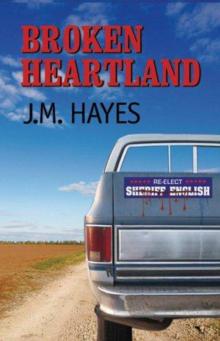 Broken Heartland
Broken Heartland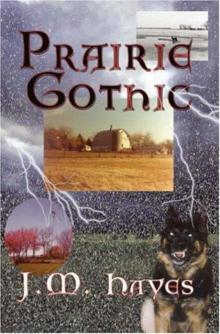 Prairie Gothic
Prairie Gothic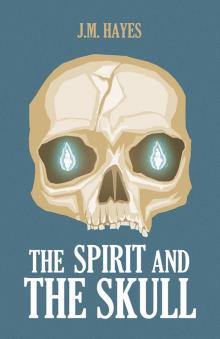 Spirit and the Skull
Spirit and the Skull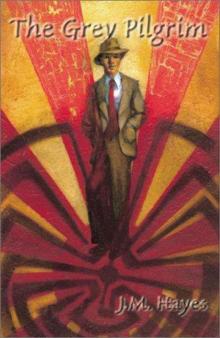 The Grey Pilgrim
The Grey Pilgrim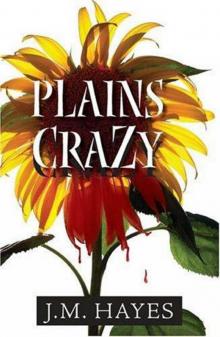 Plains Crazy
Plains Crazy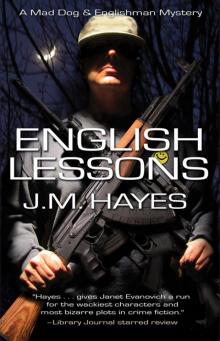 English Lessons
English Lessons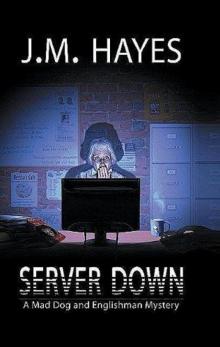 Server Down
Server Down